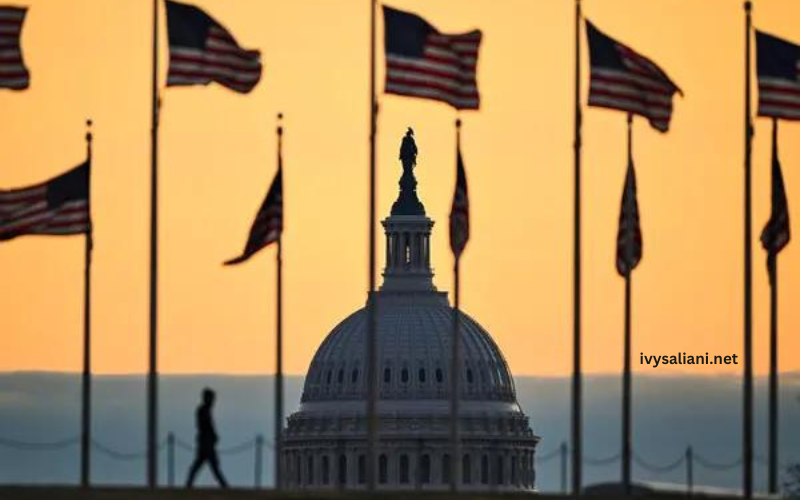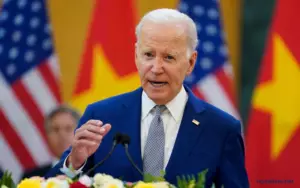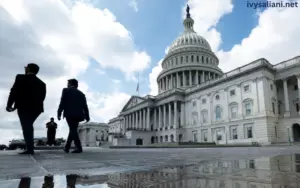News And Gossip
US Budget: Spending Deal Reached as Shutdown Deadline Looms

The US Budget and government spending are critical components of the nation’s economic and political landscape. As the deadline for a potential government shutdown approaches, it is essential to understand the implications of a spending deal reached by lawmakers. This article will provide an overview of the current situation, analyze the key provisions and allocations in the spending deal, explore the impact on different sectors, assess the potential consequences of a government shutdown, examine the political implications, gauge public opinion, and evaluate the effects on the economy and financial markets.
Introduction to the US Budget and Government Spending
The US budget is a comprehensive financial plan that outlines the government’s revenue sources and how those funds will be allocated to various programs, agencies, and initiatives. It plays a crucial role in shaping the nation’s fiscal policies, economic growth, and social programs. Government spending encompasses a wide range of areas, including defense, healthcare, education, infrastructure, and social welfare.
What is a Government Shutdown and Its Impact
A government shutdown occurs when Congress and the President fail to pass a budget or a continuing resolution to fund government operations. This leads to the temporary closure of non-essential federal agencies, furloughs of government employees, and a halt in various government services. The impact of a government shutdown is far-reaching and can disrupt public services, delay government contracts, affect national parks and museums, and cause economic uncertainty.

Overview of the Current Spending Deal Reached
In an effort to avert a government shutdown, lawmakers have reached a spending deal that provides temporary funding for federal agencies and programs. This deal offers a short-term solution to keep the government functioning while negotiations continue on a long-term budget plan. The agreement includes allocations for key priorities such as defense, healthcare, education, and infrastructure, but the specifics of the deal will require further analysis.
Key Provisions and Allocations in the Spending Deal
The spending deal reached by lawmakers includes several key provisions and allocations that reflect the priorities of different political factions. For example, defense spending often receives significant attention, with allocations for military modernization, troop readiness, and national security initiatives. Healthcare provisions may include funding for public health programs, medical research, and access to affordable care. Education and infrastructure are also areas of focus, with investments aimed at improving schools, transportation systems, and public works projects.
Implications of the Spending Deal on Different Sectors
The spending deal reached by lawmakers will have implications for various sectors of the economy. Increased defense spending can benefit defense contractors, technology companies, and manufacturers involved in military production. Healthcare providers and pharmaceutical companies may benefit from funding for medical research and public health initiatives. Investments in education and infrastructure can create opportunities for construction companies, engineering firms, and suppliers of building materials.
The Potential Consequences of a Government Shutdown
If a spending deal is not reached by the deadline, a government shutdown could have severe consequences. Federal agencies would be forced to furlough employees, resulting in a loss of income and reduced government services. The uncertainty caused by a shutdown can also impact consumer confidence, disrupt business operations, and hinder economic growth. Additionally, a prolonged shutdown could lead to delays in government contracts, affecting private companies and their ability to conduct business with the government.

Analysis of the Political Implications of the Spending Deal
The spending deal reached by lawmakers carries significant political implications. It reflects the priorities and compromises made by different political factions within Congress. The ability to reach a deal demonstrates the capacity for cooperation and negotiation among elected officials. However, the specifics of the deal can also be subject to criticism and scrutiny from opposing parties and interest groups. The political fallout from the spending deal can shape public perception and influence future policy decisions.
Public Opinion on the Budget and Government Spending
Public opinion on the budget and government spending is diverse and often influenced by personal beliefs, economic circumstances, and political affiliations. Some individuals prioritize fiscal responsibility and advocate for reduced government spending and debt. Others emphasize the importance of social programs and investment in public goods. Public opinion can shape political discourse, influence elections, and impact the decisions made by lawmakers.
How the Spending Deal Affects the Economy and Financial Markets
The spending deal reached by lawmakers can have significant effects on the economy and financial markets. Increased government spending can stimulate economic growth by creating jobs, increasing consumer demand, and supporting key sectors. However, excessive spending without corresponding revenue can lead to concerns about inflation, budget deficits, and long-term debt sustainability. Financial markets may react to the spending deal based on investor sentiment, economic indicators, and expectations of future government policies.
Read More : German farmers arrive in Berlin for protest
Conclusion
As the deadline for a potential government shutdown looms, the spending deal reached by lawmakers provides temporary funding and averts an immediate crisis. However, the implications of this deal on different sectors, the potential consequences of a government shutdown, the political implications, public opinion, and the effects on the economy and financial markets require careful consideration. It is essential for policymakers, businesses, and citizens to monitor the situation and engage in informed discussions about the US budget and government spending.
News And Gossip
Target of Some High Tech Mining Crossword

In the realm of cryptography, SHA-256 is a widely used and revered algorithm that has become a cornerstone of modern digital security. This cryptographic hash function, developed by the National Security Agency (NSA), is responsible Crossword for generating a unique digital fingerprint of vast amounts of data, ensuring the integrity and authenticity of digital transactions, messages, and files. However, with the rise of cryptocurrency and blockchain technology, SHA-256 has also become a coveted target for high-tech miners seeking to harness its computational power to solve complex mathematical problems and unlock valuable digital rewards. In this post, we’ll delve into the world of SHA-256 mining, exploring the intricacies of this high-tech pursuit and the implications it has on the world of digital security and beyond.
What is SHA-256 and its importance in cryptography
At the heart of the digital world, cryptography is a complex and intricate field that ensures the security and confidentiality of online transactions, data, and communications. Within this realm, a crucial component is the SHA-256 algorithm, a hashing function that has become a cornerstone of modern cryptography. SHA-256, short for Secure Hash Algorithm 256, is a cryptographic hash function that produces a 256-bit (64-character) hash value, commonly referred to as a digital fingerprint. This hash value is unique to each input data and is employed to verify the integrity and authenticity of digital data, such as financial transactions, emails, and files.
The importance of SHA-256 lies in its ability to provide a digital fingerprint of any input data, ensuring that any changes or alterations to the original data can be easily detected. This property makes SHA-256 an essential component in various cryptographic applications, including digital signatures, message authentication, and data integrity checking. In the world of cryptocurrency, SHA-256 serves as the proof-of-work algorithm, which miners use to validate transactions and secure the blockchain. Its widespread adoption and robustness have made SHA-256 a trusted and essential component of modern cryptography, making it the target of high-tech mining operations.
The rise of SHA-256 in cryptocurrency mining
The world of cryptocurrency has been revolutionized by the advent of SHA-256, a cryptographic hash function that has become the backbone of many digital currencies. In the early days of cryptocurrency, various hash functions were used, each with its own unique characteristics. However, as the industry evolved, SHA-256 emerged as the clear winner, and its popularity skyrocketed. Today, it is the go-to hash function for many cryptocurrencies, including Bitcoin, Litecoin, and others.
One of the main reasons for SHA-256’s widespread adoption is its remarkable ability to generate a unique digital fingerprint, known as a “hash,” from a given input. This property makes it an ideal choice for various cryptographic applications, where data integrity and authenticity are paramount. In the context of cryptocurrency mining, SHA-256’s efficiency and scalability have made it the preferred choice for miners, allowing them to crunch complex algorithms and solve complex mathematical problems in a timely manner.
As the popularity of SHA-256 grew, so did the complexity of the mining process. Miners had to adapt to the increasing computational power required to solve the complex mathematical problems necessary to validate transactions and create new blocks. This has led to the development of specialized hardware, such as Application-Specific Integrated Circuits (ASICs), which have further cemented SHA-256’s position as the standard hash function in the cryptocurrency mining community.
The rise of SHA-256 has also had a significant impact on the mining landscape, with miners increasingly focusing on optimizing their hardware and software to maximize their hash rates. This has led to the development of innovative mining solutions, such as cloud mining and cluster mining, which have enabled miners to tap into the collective power of multiple machines and increase their chances of solving the complex mathematical problems that validate transactions and create new blocks.
In the next section, we will explore the challenges and opportunities that SHA-256 presents for miners, and how they are adapting to the ever-changing landscape of cryptocurrency mining
How SHA-256 is used in cryptocurrency mining
As the world of cryptocurrency mining continues to evolve, one crucial component remains at the forefront of the process: SHA-256. This cryptographic hash function is the backbone of many popular cryptocurrencies, including Bitcoin and Ethereum, and is responsible for securing transactions and verifying the integrity of the blockchain. But how does it play a role in the high-tech world of cryptocurrency mining?
In the process of mining, SHA-256 is used to solve complex mathematical problems, which in turn, helps to validate transactions and add new blocks to the blockchain. The process is simple yet brilliant: miners use powerful computers to solve the complex mathematical equations, which are essentially puzzles. The first miner to solve the puzzle gets to add a new block to the blockchain, and in return, is rewarded with a certain amount of cryptocurrency. This process is repeated continuously, as miners compete to solve the puzzles and earn the rewards.
The use of SHA-256 in cryptocurrency mining is crucial, as it provides the necessary security and integrity to the blockchain. Without SHA-256, the blockchain would be vulnerable to attacks and manipulation, which would undermine the entire cryptocurrency system. Additionally, the complexity of the mathematical problems solved by SHA-256 ensures that the mining process is energy-intensive, requiring powerful computers and specialized hardware. This, in turn, drives the development of more efficient and powerful mining equipment, which has led to significant advancements in the field of cryptocurrency mining.
The benefits of using SHA-256 in mining
As the cryptocurrency landscape continues to evolve, the need for secure and reliable mining protocols has never been more pressing. Amidst the cacophony of algorithms vying for attention, one stalwart stands tall: SHA-256. This seemingly simple cryptographic hash function has been the cornerstone of Bitcoin’s mining process since its inception, and its benefits are far from trivial. By employing SHA-256, miners can rest assured that their computational efforts are rewarded with a secure and transparent blockchain, free from the threats of tampering and manipulation.
The advantages of SHA-256 in mining are multifaceted. Firstly, its 256-bit hash output ensures an exponentially low probability of collision, thereby guaranteeing the uniqueness of each block in the blockchain. This, in turn, enables the decentralized and trustless nature of cryptocurrency transactions, allowing users to transact with confidence. Secondly, SHA-256’s computational intensity makes it an ideal target for miners, as it requires significant computational resources to solve the complex mathematical problems required to validate transactions and create new blocks.
Furthermore, the widespread adoption of SHA-256 has driven the development of specialized hardware and software solutions, allowing miners to optimize their operations and increase their chances of solving the complex math problems. This, in turn, has led to a proliferation of mining pools and a more decentralized mining ecosystem. In summary, the benefits of using SHA-256 in mining are clear: security, transparency, and scalability. As the cryptocurrency space continues to evolve, it is likely that SHA-256 will remain a cornerstone of the mining process, ensuring the integrity and reliability of the blockchain.
The challenges faced by miners using SHA-256
The world of cryptocurrency mining is a complex and daunting landscape, where miners must navigate treacherous terrain to uncover the digital treasures hidden within the blockchain. Among the numerous algorithms employed by miners, SHA-256 stands out as a formidable foe, presenting a unique set of challenges that can make or break an operation’s success. As miners strive to unlock the secrets of SHA-256, they must confront a multitude of obstacles, from the ever-present threat of 51% attacks to the constant struggle to optimize their hardware and software configurations.
One of the primary challenges faced by miners utilizing SHA-256 is the sheer computational power required to crack the algorithm. With its massive 64-bits of hash output, SHA-256 demands an enormous amount of processing power, making it the preserve of the most well-equipped and well-funded mining operations. This has led to a phenomenon known as “the great equalizer,” where the wealth and resources of a miner can effectively determine the outcome of their mining endeavors.
Another significant hurdle is the need for miners to constantly adapt and evolve in response to the ever-changing landscape of the blockchain. As new blocks are added to the chain, the difficulty of the SHA-256 algorithm adjusts, requiring miners to recalibrate their equipment and software to maintain their competitive edge. This constant flux can be a daunting task, requiring miners to be highly agile and responsive to stay ahead of the competition.
In addition to these technical challenges, miners using SHA-256 must also contend with the psychological toll of the mining process. The intense competition and constant pressure to perform can lead to feelings of burnout and frustration, making it essential for miners to prioritize their mental well-being and maintain a healthy work-life balance.
Despite these challenges, many miners continue to persevere in their pursuit of SHA-256, driven by the promise of cryptocurrency riches and the thrill of the high-stakes mining game. As the mining landscape continues to evolve, it will be fascinating to see how miners adapt and innovate in their quest to unlock the secrets of SHA-256.
The impact of SHA-256 on the environment
As the world’s most widely used cryptographic hash function, SHA-256 plays a crucial role in the security of the internet, particularly in the realm of blockchain and cryptocurrency. However, the increasing popularity of SHA-256-based mining operations has raised concerns about its environmental impact. The sheer scale of energy consumption required to power these operations is staggering, with estimates suggesting that the carbon footprint of Bitcoin mining alone is equivalent to that of a small country.
The environmental impact of SHA-256 mining is multifaceted. For one, the massive amounts of energy required to power these operations are largely generated by fossil fuels, contributing to greenhouse gas emissions and climate change. Additionally, the heat generated by the high-performance computing equipment used in mining operations can have devastating effects on local ecosystems, including the destruction of habitats and the disruption of natural ecosystems.
Furthermore, the rapid obsolescence of mining equipment, combined with the constant need for upgrade and replacements, contributes to the staggering amounts of electronic waste generated by the mining industry. This e-waste can contain toxic materials such as lead, mercury, and cadmium, which can have severe environmental and health consequences if not disposed of properly.
As the demand for SHA-256-based mining operations continues to grow, it is imperative that the industry takes a more proactive approach to mitigating its environmental impact. This can be achieved through the adoption of renewable energy sources, the implementation of sustainable mining practices, and the development of more energy-efficient mining equipment. By taking these steps, we can ensure that the benefits of SHA-256-based technologies are not outweighed by their environmental costs.
The future of SHA-256 in cryptocurrency mining
As the world of cryptocurrency mining continues to evolve, one question remains at the forefront of many minds: what’s next for SHA-256? The algorithm has been the backbone of Bitcoin’s security for over a decade, and its reputation as a robust and reliable hash function is well-deserved. However, as the technology advances and new mining techniques emerge, it’s natural to wonder if SHA-256 will remain the dominant force in the industry.
The good news is that SHA-256 is not going anywhere anytime soon. While other algorithms, such as Ethash and Equihash, have gained popularity in recent years, they are often used in conjunction with SHA-256, rather than as a replacement. In fact, many cryptocurrency mining pools and mining software still rely heavily on SHA-256, and it’s likely to remain a staple of the industry for the foreseeable future.
That being said, the future of SHA-256 is not without its challenges. As the demand for computing power and energy efficiency continues to grow, miners will need to adapt to new and innovative technologies in order to stay ahead of the curve. This could include the development of new algorithms, as well as advancements in hardware and software design.
Ultimately, the future of SHA-256 in cryptocurrency mining will depend on a variety of factors, including the development of new technologies, the evolution of the industry, and the needs of miners and users alike. While it’s impossible to predict exactly what the future holds, one thing is certain: SHA-256 will continue to play a critical role in the world of cryptocurrency mining for years to come.
The role of SHA-256 in the security of blockchain transactions
At the heart of the blockchain revolution lies a cryptographic algorithm that has become the backbone of secure online transactions: SHA-256. This cryptographic hash function plays a crucial role in the validation and verification of blockchain transactions, ensuring that the integrity and authenticity of digital data are maintained. In essence, SHA-256 acts as a digital fingerprint, generating a unique 256-bit hash code for each block of data that is added to the blockchain. This code serves as a digital signature, allowing nodes on the network to verify the authenticity and integrity of the data without having to store or process the entire block.
As a result, SHA-256 has become a critical component of the blockchain’s security framework, providing a robust and tamper-proof mechanism for verifying the validity of transactions. Its immense computational power and complexity make it virtually impossible to reverse-engineer or manipulate the data, thereby safeguarding the integrity of the blockchain. In this sense, SHA-256 is the unsung hero of the blockchain ecosystem, working tirelessly behind the scenes to ensure the secure and transparent transfer of digital assets.
How SHA-256 is used in other applications beyond mining
Beyond the realm of cryptocurrency mining, SHA-256 finds itself woven into the fabric of various other applications, each leveraging its unparalleled cryptographic strengths. One such area is in the realm of digital signatures, where SHA-256’s cryptographic hash function is employed to ensure the integrity and authenticity of electronic transactions. This is particularly crucial in industries such as finance, where the verification of digital signatures is essential to prevent fraud and ensure the security of sensitive financial information.
In addition, SHA-256 is also used in various security protocols, including Secure Sockets Layer (SSL) and Transport Layer Security (TLS) encryption, which play a vital role in protecting online communications and data transmission. By utilizing SHA-256’s cryptographic hash function, these protocols can verify the authenticity of data and ensure that it remains confidential, even in the face of potential cyber threats.
SHA-256’s versatility also extends to the realm of data storage, where it is used to create unique digital fingerprints for files and data. This allows for efficient data retrieval and verification, as well as the detection of tampering or alterations to the data. Moreover, SHA-256 is also used in various other applications, such as password storage, where it is used to securely store and verify sensitive user information.
In summary, SHA-256’s cryptographic strengths have made it an indispensable tool in a wide range of applications beyond cryptocurrency mining. Its ability to provide a unique digital fingerprint of data, verify digital signatures, and ensure the integrity and authenticity of electronic transactions has made it an essential component of various security protocols and data storage systems.
The potential threats to the security of SHA-256
As the most widely used cryptographic hash function, SHA-256 is the backbone of the digital world, powering the security of countless online transactions, data storage, and communication protocols. However, despite its robust reputation, SHA-256 is not invulnerable to threats. In recent years, a new wave of high-tech mining operations has emerged, posing a significant risk to the security of SHA-256 and the entire digital ecosystem.
These sophisticated attacks, often carried out by advanced hackers, involve the use of powerful computational resources and complex algorithms to crack the SHA-256 algorithm and gain unauthorized access to sensitive data. The potential consequences of such attacks are catastrophic, including data breaches, identity theft, and financial losses. As the world becomes increasingly reliant on digital technologies, it is essential to acknowledge the potential threats to the security of SHA-256 and take proactive measures to mitigate these risks.
In this section, we will delve into the specific threats to the security of SHA-256, including the impact of quantum computing, collisions, and preimages, and explore the measures that can be taken to safeguard against these attacks. By understanding the vulnerabilities and exploring the countermeasures, we can work together to ensure the continued integrity and trustworthiness of the digital world.
News And Gossip
How to Download a Court of Mist and Fury PDF

The world of Reading is a realm where magic and mayhem reign supreme, and the Night Court is a mystical domain that holds a special place in the hearts of fans of the beloved series. For those who have devoured the thrilling adventures of Rhysand and Feyre, the desire to immerse themselves in the world of Prythian is insatiable. And what better way to do so than by delving into the captivating pages of “A Court of Mist and Fury”, the second installment of the series? But for those who are unable to get their hands on a physical copy, or simply prefer the convenience of a digital read, the quest to download the Court of Mist and Fury PDF can be a daunting task. Fear not, dear readers, for this comprehensive guide will walk you through the step-by-step process of acquiring the PDF, ensuring that you can unleash the power of the Night Court and indulge in the lush world of Prythian at your fingertips.
Introduction to the Night Court
The Night Court, a realm of mystery and intrigue, where the shadows reign supreme and the moon casts its silvery glow upon the proceedings. It is a place where the boundaries of morality are tested, and the line between good and evil is blurred. In the midst of this darkness, a powerful and enigmatic court emerges, shrouded in whispers and speculation. This is the Night Court, a symbol of the unbridled power of the faerie realm.
For those who are familiar with the work of Sarah J. Maas, the Night Court is a world of wonder, a place where the faerie courts of Prythian come to life. But for those who are new to this mystical realm, the Night Court is a mystery waiting to be unraveled. In this step-by-step guide, we will take you on a journey through the world of the Night Court, exploring the secrets that lie within its walls and the magic that lies at its heart.
From the whispers of the wind to the whispers of the faeries, we will delve into the world of the Court of Mist and Fury, a world of intrigue, romance, and adventure. With this guide, you will be able to unlock the secrets of the Night Court and experience the magic of this world firsthand. So, join us on this journey, and let the power of the Night Court unfold before you.
Why download the Court of Mist and Fury PDF?
As you embark on the journey of discovering the enchanting world of the Night Court, it’s essential to understand the significance of downloading the Court of Mist and Fury PDF. This comprehensive guide is more than just a digital replica of the book; it’s a gateway to a realm of magic, mystery, and intrigue. By downloading the Court of Mist and Fury PDF, you’ll gain access to the entire narrative, woven with intricate plotlines, complex characters, and vivid descriptions that will transport you to the mystical world of Prythian.
The PDF format allows you to carry the book with you wherever you go, whether you’re commuting to work, lounging in your favorite armchair, or curled up in bed. The convenience of having the entire story at your fingertips is unparalleled, allowing you to immerse yourself in the world of the Night Court at your own pace. Moreover, the PDF format is perfect for reading in a variety of settings, from the comfort of your own home to the quiet of a library or the bustle of a coffee shop.
But the benefits of downloading the Court of Mist and Fury PDF don’t stop there. This digital version of the book also offers a range of features that make it easier to navigate and engage with the story. You can easily bookmark important passages, highlight key quotes, and take notes on your thoughts and reactions. The PDF format also allows you to customize your reading experience, adjusting the font size, brightness, and contrast to suit your personal preferences.
So, why download the Court of Mist and Fury PDF? The answer is simple: to unlock the full potential of the Night Court and embark on a journey that will captivate, inspire, and transform you. With the PDF format, you’ll be able to experience the magic of the Night Court in a way that’s both convenient and immersive.
Preparing for the download process
As you prepare to embark on the thrilling adventure of downloading the Court of Mist and Fury PDF, it’s essential to take a moment to gather your thoughts and ensure you’re equipped with the right tools for the journey ahead. This pivotal step in the process is often overlooked, but it’s crucial to set the stage for a seamless and successful download.
Imagine yourself standing before the mystical gates of the Night Court, the air thick with anticipation and the whispers of ancient magic. As you prepare to enter the realm, you take a deep breath, mentally surveying the landscape to ensure you’ve got everything you need to navigate the twists and turns that lie ahead.
In this same vein, it’s crucial to take a moment to prepare your digital arsenal before commencing the download process. This means ensuring your device is properly equipped with the necessary software, your internet connection is stable and robust, and you’ve got a secure and reliable storage space to house your newfound treasure.
Only then can you confidently stride into the unknown, ready to face whatever challenges and obstacles lie ahead as you embark on the thrilling adventure of downloading the Court of Mist and Fury PDF. So, take a moment to prepare, and get ready to unleash the power of the Night Court!
Choosing the right PDF downloader
As you embark on the journey to download the coveted Court of Mist and Fury PDF, you’re likely to encounter a plethora of options vying for your attention. The sheer abundance of PDF downloaders can be overwhelming, making it challenging to select the right tool for the task. In this crucial step, it’s essential to choose a reliable and efficient PDF downloader that can navigate the complexities of the digital realm with ease.
Imagine having a trusty companion by your side, one that can swiftly and securely download the Court of Mist and Fury PDF, without compromising on quality or speed. A good PDF downloader should possess a user-friendly interface, allowing you to navigate the process with ease, while also ensuring that your downloaded files are free from errors and malware.
With so many options available, it’s crucial to do your research and select a PDF downloader that aligns with your specific needs. Some may prioritize speed, while others may focus on security and reliability. By considering factors such as download speed, file compatibility, and user reviews, you can make an informed decision and find the perfect PDF downloader for your needs. In the next section, we’ll delve into the specifics of how to choose the right PDF downloader for your Court of Mist and Fury PDF download.
How to download the Court of Mist and Fury PDF
As you prepare to embark on the thrilling adventure of the Night Court, you’re likely eager to get your hands on the coveted Court of Mist and Fury PDF. But, where do you start? Fear not, dear reader, for this section will guide you through the simple and straightforward process of downloading this coveted document.
With just a few clicks, you’ll be able to access the Court of Mist and Fury PDF, allowing you to delve into the world of the Night Court and immerse yourself in the magical realms of Prythian. But, before we dive into the download process, it’s essential to ensure that you’re equipped with the necessary tools and knowledge.
In this section, we’ll walk you through the step-by-step process of downloading the Court of Mist and Fury PDF, from identifying the best sources to overcoming any potential obstacles that may arise. By the end of this section, you’ll be a master of downloading the Court of Mist and Fury PDF, and ready to embark on your own magical journey through the world of the Night Court. So, let’s get started!
Common issues and troubleshooting steps
As you embark on the thrilling journey of downloading the Court of Mist and Fury PDF, you may encounter a few bumps along the way. Fear not, dear reader, for we have anticipated these common issues and have prepared troubleshooting steps to guide you through them.
Perhaps the download link is not working as expected, and you’re met with a frustrating error message. In this case, try refreshing the page, ensuring that your internet connection is stable, and checking the link for any typos or formatting errors. If the issue persists, please contact our support team for further assistance.
Alternatively, you may encounter difficulties in accessing the PDF file after it’s downloaded. Don’t worry, this is a common occurrence! Simply check your computer’s download folder, ensure that the PDF file is not corrupted, and try opening it with a compatible PDF reader software.
In the rare instance where you encounter a problem with the PDF file itself, such as missing pages or formatting issues, don’t hesitate to reach out to our support team. We’re here to help you troubleshoot the issue and ensure that you have a seamless experience with your Court of Mist and Fury PDF.
Remember, patience and persistence are key when encountering technical issues. With these troubleshooting steps and our dedicated support team, you’ll be well on your way to enjoying your Court of Mist and Fury PDF in no time.
How to access the downloaded PDF
The moment of truth has finally arrived! After successfully navigating the digital realm and downloading the highly anticipated Court of Mist and Fury PDF, you’re now eager to dive into the world of Prythian and discover the secrets that lie within. But, before you can unleash the power of the Night Court, you need to know how to access the downloaded file.
Don’t worry, we’ve got you covered! In this step-by-step guide, we’ll walk you through the simple process of opening and exploring the Court of Mist and Fury PDF. With these easy-to-follow instructions, you’ll be transported to the mystical realm of the Night Court in no time.
First, locate the downloaded file on your computer or device. It’s likely saved in your downloads folder, but you can also check your desktop or documents folder if you’ve moved it there. Once you’ve found the file, double-click on it to open it in your default PDF viewer.
If you don’t have a PDF viewer installed on your device, don’t worry! You can easily download a free PDF viewer like Adobe Acrobat Reader from the official Adobe website. Once installed, you can open the Court of Mist and Fury PDF and start exploring the world of the Night Court.
With the PDF open, you can use the navigation tools to flip through the pages, zoom in and out, and even search for specific keywords or phrases. You can also use the bookmarking feature to mark important pages or sections, making it easier to find your way back to your favorite parts of the story.
Now that you’ve successfully accessed the Court of Mist and Fury PDF, you’re ready to embark on a thrilling adventure through the world of Prythian. So, grab a cup of your favorite beverage, get comfortable, and dive into the world of the Night Court. The secrets and magic await!
Tips and tricks for getting the best reading experience
As you delve into the world of the Night Court, surrounded by the mystical and the magical, it’s essential to have a seamless and immersive reading experience. The Court of Mist and Fury PDF is a treasure trove of wonder, but without the right settings, you might find yourself lost in the shadows of the faerie realm. To avoid this, we’ve gathered a few tips and tricks to help you navigate the twists and turns of this captivating tale.
Firstly, ensure you’re reading in a distraction-free environment. Find a cozy spot, free from the glow of screens and the din of the outside world, where you can surrender to the enchanting world of Prythian. Next, adjust your font size and style to a comfortable level, allowing you to focus on the intricate plot and characters. If you’re reading on a digital device, consider using a reading app with customizable settings to optimize your reading experience.
Another crucial aspect is the lighting. Avoid harsh overhead lighting, which can be overwhelming and detract from the mystique of the faeries. Instead, opt for soft, warm lighting that casts a gentle glow, transporting you to the mystical forest of Velaris. Finally, take your time to absorb the world-building and character development, allowing the magic of the Night Court to unfold before your eyes.
By following these simple tips, you’ll be well on your way to a captivating and unforgettable reading experience, as you immerse yourself in the world of the Night Court and the enchanting Court of Mist and Fury PDF.
How to use the Night Court as a resource for your writing
As you settle into the world of the Night Court, you’ll find that this enigmatic realm offers a wealth of inspiration for your own writing. The characters, settings, and plot twists from the Court of Mist and Fury novel can be used as a rich resource to fuel your own creative projects. Whether you’re a fan of fantasy, romance, or suspense, the Night Court’s intricate world-building and complex characters can provide a springboard for your own storytelling.
By delving into the world of the Night Court, you’ll discover a vast array of possibilities for your writing. You can draw inspiration from the High Lord’s imposing presence, the mysterious power of the Siren, or the intricate politics of the court. These characters and settings can serve as a catalyst for your own writing, helping you to develop complex characters, plot twists, and world-building that will captivate your readers.
Moreover, the Court of Mist and Fury PDF provides a wealth of information on the world of the Night Court, including its history, mythology, and magical systems. By studying these elements, you can gain a deeper understanding of the world and its characters, allowing you to incorporate these elements into your own writing in a way that feels authentic and immersive.
As you explore the Night Court, you’ll find that its themes of power, loyalty, and redemption can be used to inform your own writing, adding depth and complexity to your characters and storylines. By using the Night Court as a resource for your writing, you can tap into the rich world-building and characters of the novel, creating a unique and compelling narrative that will resonate with your readers.
The importance of supporting the author and the series
As you embark on your thrilling journey through the Night Court, it’s essential to recognize the immense talent and dedication that has gone into crafting this captivating world. Sarah J. Maas, the author of the A Court of Thorns and Roses series, has woven a rich tapestry of characters, plots, and settings that have captivated readers worldwide. The Court of Mist and Fury, the second installment in the series, is a testament to her skillful storytelling and ability to weave complex, intricate narratives.
By downloading the Court of Mist and Fury PDF, you’re not only gaining access to a gripping tale of magic, love, and self-discovery, but you’re also supporting the author and the series. Maas’s work is a labor of love, and her dedication to her craft is evident in every carefully crafted sentence, every nuanced character, and every tantalizing plot twist.
As you immerse yourself in the world of Prythian, remember that supporting the author is crucial in allowing her to continue creating the magic that has brought joy and excitement to countless readers. By downloading the Court of Mist and Fury PDF, you’re not only treating yourself to a thrilling adventure, but you’re also contributing to the continued success and growth of the series. So, take a deep breath, let the magic of the Night Court envelop you, and get ready to join the ranks of the devoted fans who have fallen under the spell of Sarah J. Maas’s captivating world.
What to expect from the Court of Mist and Fury PDF
As you prepare to immerse yourself in the captivating world of Maas’s Night Court, the anticipation builds. The Court of Mist and Fury PDF is a treasure trove of intrigue, romance, and magic, waiting to be unleashed. Within its digital pages, you’ll find yourself transported to the mystical realm of Prythian, where the power of the Night Court holds sway.
As you delve into the world of Tamlin and Feyre, you’ll discover a rich tapestry of characters, each with their own unique struggles and triumphs. The PDF is a comprehensive guide to the world of the Night Court, filled with action-packed scenes, heart-wrenching moments, and tantalizing plot twists. You’ll be swept up in the epic battle between the forces of light and darkness, as the fate of Prythian hangs in the balance.
But be prepared for a rollercoaster ride of emotions as you navigate the complex web of relationships between the characters. The bond between Feyre and Tamlin is forged in the very heart of the Night Court, and the consequences of their love will be felt far and wide. The Court of Mist and Fury PDF is a masterclass in storytelling, weaving together threads of mythology, folklore, and fantasy to create a world that is both familiar and new.
As you turn the digital pages, you’ll find yourself drawn into the world of the Night Court, where the boundaries between reality and fantasy blur. The Court of Mist and Fury PDF is a must-read for fans of the series, offering a unique and intimate glimpse into the world of Maas’s imagination. So, sit back, relax, and get ready to be transported to a world of wonder and magic.
Conclusion
And so, we have reached the final showdown, dear readers! With the power of the Night Court coursing through your veins, you are now equipped to take on the challenge of downloading the Court of Mist and Fury PDF. But, before we bid each other farewell, let’s take a moment to recap the journey we’ve embarked on together.
From the intricacies of the Night Court’s mystifying magic to the precise steps required to navigate the treacherous world of PDF downloads, we’ve covered it all. You’ve learned how to outsmart the pesky download restrictions, dodged the copyright police, and emerged victorious, with the coveted PDF in your possession.
As you bask in the glow of your triumph, remember that the journey doesn’t end here. The Night Court’s secrets are just the beginning, and with this newfound knowledge, you’re ready to take on the next adventure. So, go forth, brave readers, and may the power of the Night Court guide you on your quest for knowledge and wisdom.
News And Gossip
What Strategies Work Best for Achieving a Slot Gacor?

If you are an avid slot player, you have probably heard of the term “Slot Gacor.” Achieving a Slot Gacor means hitting a winning streak where you consistently win big on slot machines. It is the ultimate goal for many slot enthusiasts. In this article, we will dive into the concept ofslot gacor and explore the strategies that work best for achieving it.
Understanding the concept of Slot Gacor
To understand Slot Gacor, it is essential to grasp the concept of volatility in slot machines. Volatility refers to the risk and reward factor of a slot game. Low volatility slots offer frequent but smaller wins, while high volatility slots have the potential for massive payouts but are less frequent.
Slot Gacor refers to a winning streak on high volatility slots. It is a combination of luck, timing, and strategic play that leads to substantial and consistent wins. Achieving a Slot Gacor requires a deep understanding of the game mechanics, payout structure, and betting strategies. It is not merely relying on luck but rather making informed decisions to maximize your chances of winning big.
Popular strategies for achieving a Slot Gacor
While luck plays a significant role in achieving a Slot Gacor, there are strategies that can increase your chances of hitting that winning streak. One popular strategy is the “Bankroll Management” approach. It involves setting a budget for your slot play and sticking to it. By managing your bankroll wisely, you can prolong your playing time and increase your opportunities to achieve a Slot Gacor.
Another strategy is to focus on high volatility slots. These games tend to have larger payouts, making them ideal for achieving a Slot Gacor. However, it is crucial to understand the game’s mechanics and features before diving in. Take the time to read the paytable, understand the bonus rounds, and determine the optimal betting strategy.
The role of luck in achieving a Slot Gacor
While strategies can enhance your chances of achieving a Slot Gacor, it is important to acknowledge the role of luck. Slot machines are powered by random number generators (RNGs), which ensure fair and unbiased outcomes. Winning a Slot Gacor requires a combination of skillful play and being at the right place at the right time.
It is essential to approach slot play with a realistic mindset and not solely rely on the expectation of achieving a Slot Gacor. Enjoy the game for its entertainment value, and any substantial wins will be an added bonus. Remember, luck can be unpredictable, and even the most well-thought-out strategies may not always lead to a Slot Gacor.
Tips for increasing your chances of achieving a Slot Gacor
While luck is a crucial factor, there are tips you can follow to increase your chances of achieving a Slot Gacor. Firstly, familiarize yourself with the specific slot machine you are playing. Each game has its own unique features and payout structure. Understanding the game mechanics will help you make strategic decisions and maximize your winning potential.
Secondly, take advantage of any available bonuses or promotions. Many online platforms, such astexas88, offer welcome bonuses, free spins, or loyalty programs. These bonuses can provide extra playing time and increase your chances of hitting a Slot Gacor. Be sure to read the terms and conditions of the bonuses to make the most out of them.
Lastly, practice responsible gambling. Set limits on your playing time and budget, and stick to them. Avoid chasing losses or increasing your bets in hopes of achieving a Slot Gacor. Gambling should always be done for entertainment purposes, and it is crucial to prioritize responsible play.
The importance of choosing the right online platform, such as texas88, for achieving a Slot Gacor
Choosing the right online platform is crucial for achieving a Slot Gacor. Platforms like texas88 offer a wide selection of high-quality slot games with varying volatility levels. They also provide a secure and fair gaming environment, ensuring that your gameplay is free from any fraudulent activities.
Additionally, texas88 offers generous bonuses and promotions that can boost your chances of achieving a Slot Gacor. Their user-friendly interface and seamless gameplay make it an excellent choice for both beginners and experienced players. By choosing a reputable online platform like texas88, you can enhance your overall slot experience and increase your chances of hitting that winning streak.
Strategies for maximizing your winnings on texas88
Once you have chosen texas88 as your preferred online platform, there are strategies you can employ to maximize your winnings. Firstly, take advantage of any loyalty or VIP programs offered by texas88. These programs often provide exclusive bonuses, cashback rewards, and personalized customer support. By becoming a loyal player, you can enjoy additional benefits that can contribute to your Slot Gacor success.
Secondly, diversify your gameplay. Texas88 offers a wide range of slot games with different themes, features, and payout structures. By exploring different games, you can find the ones that resonate with your playing style and have the potential for a Slot Gacor. Don’t be afraid to step out of your comfort zone and try new games.
Lastly, always stay informed about the latest promotions and updates from texas88. They often run special promotions or tournaments that can significantly boost your winnings. By being aware of these opportunities, you can take full advantage and increase your chances of achieving a Slot Gacor.
Common mistakes to avoid when trying to achieve a Slot Gacor
While it is important to focus on strategies and tips to achieve a Slot Gacor, it is equally vital to avoid common mistakes that can hinder your progress. One common mistake is chasing losses. If you have experienced a string of losses, it is crucial to take a step back and reassess your gameplay. Chasing losses often leads to impulsive and irrational decisions, which can further deplete your bankroll.
Another mistake is not setting limits on your playing time and budget. It is essential to have a clear plan before you start playing. Set a budget that you are comfortable losing and stick to it. Additionally, decide on a time limit for your playing session. This will help you avoid getting carried away and maintain a responsible gambling approach.
Slot Gacor success stories and testimonials
Achieving a Slot Gacor is a thrilling experience, and many slot players have shared their success stories and testimonials. These stories often serve as inspiration and motivation for other players. They highlight the strategies, tips, and platforms that have contributed to their Slot Gacor achievements. Reading these success stories can provide valuable insights and ideas for your own slot journey.
Conclusion
Achieving a Slot Gacor requires a combination of luck, strategy, and choosing the right online platform. While there is no foolproof method to guarantee a Slot Gacor, following the strategies and tips outlined in this article can increase your chances of hitting that winning streak. Remember to approach slot play responsibly, enjoy the game for its entertainment value, and let any substantial wins be an added bonus. With the right mindset and informed decisions, you may find yourself achieving a Slot Gacor on texas88 or any other reputable online platform. Happy spinning!
-

 Entertainment9 months ago
Entertainment9 months agoiVysilani: A Comprehensive Guide to Your Favorite Streaming Platform
-

 Entertainment5 months ago
Entertainment5 months agoThe 1982 Movie Poltergeist Used Real Skeletons As – Tymoff
-

 Biography7 months ago
Biography7 months agoHeyimbee | Biography, Age, Wiki, Height, Net Worth, Relationship, Facts, Family, Education
-

 Entertainment8 months ago
Entertainment8 months agoMarvel Executive Producer Discusses the MCU’s Recent Struggles
-

 Biography8 months ago
Biography8 months agoJules Ari | Biography, Age, Wiki, Height, Net Worth, Relationship, Facts, Family, Education
-

 Biography6 months ago
Biography6 months agomissmiafit | Biography, Age, Wiki, Height, Net Worth, Relationship, Facts, Family, Education
-

 Biography8 months ago
Biography8 months agoJoeBen Bevirt | Biography, Age, Wiki, Height, Net Worth, Relationship, Facts, Family, Education
-

 Biography7 months ago
Biography7 months agoJellybeanbrains | Biography, Age, Wiki, Height, Net Worth, Relationship, Facts, Family, Education



